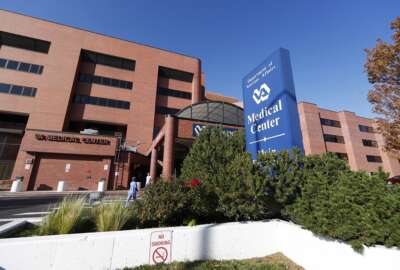A total of 1,895 employees at the Veterans Health Administration have tested positive for coronavirus, the department said Wednesday.
The total is up nearly 300 from the previous week, when 1,604 VA employees had been diagnosed with the virus.
As of Wednesday 20 VA employees have died from complications due to coronavirus, the department said.
Of the 20, 14 employees didn’t work in direct patient care roles, Christina Noel, the department’s spokeswoman, said.
The number of positive VA employees make up less than 1% of the department’s workforce, Noel said.
“VA’s PPE practices are keeping veterans and employees safe during challenging times and the numbers prove it,” she said in a statement.
Employee unions, however, have for weeks said VA employees working on the frontlines of the pandemic lack the personal protective equipment (PPE) they need to care for coronavirus patients.
The Occupational Safety and Health Administration is launching an investigation into the complaints the American Federation of Government Employees made about VA working conditions.
AFGE members this week rallied outside VA medical centers in Baltimore and Salem, Massachusetts, calling for hazard pay and expanded leave and testing procedures for employees.
The department has implemented austerity measures “out of an abundance of caution” to ensure employees treating patients with the virus had the masks they need, Richard Stone, executive in charge of the Veterans Health Administration, said last week.
“There have been a lot of rumors about PPE, including our ability to have a sufficient supply of what is needed for our employees, so let me very clear: your safety is the most important thing I am responsible for — every employee needs to be safe,” he said in an email to VHA employees last week. “That is my commitment to you, and your facility leaders take this extremely seriously as well.”
VA employees not working directly with coronavirus patients are receiving one mask a week per guidelines from the Centers for Disease Control and Prevention, Stone said. Employees at VA community living centers, spinal cord injury units and inpatient mental health units will receive one mask a day.
“Your safety is the most important thing to us; we need to protect you,” Stone said. “I give you my word that we are doing everything to help you continue to take care of our veterans.”
Click on the points on the map to view the number of employees diagnosed with coronavirus at each VA medical facility.
A group of Senate Democrats, including Tim Kaine and Mark Warner (Va), Jack Reed (R.I.), Michael Bennett (Colo.) and Sherrod Brown (Ohio), raised their own concerns earlier this week about personal protective equipment supplies at VA facilities.
“VA leadership has asserted that they have enough PPE at their facilities and that their employees have access to the necessary PPE, given these guidelines,” the senators wrote in an April 20 letter to VA Secretary Robert Wilkie. “We are concerned that this guidance may be driven not by best practices for VA staff and patients, but by PPE shortages throughout the system.”
VA facilities juggling veteran and civilian patients
One VA nurse told Federal News Network his facility hasn’t yet run out of the N95 masks, gloves, gowns and other supplies he and his colleagues need to protect themselves.
The bigger concern, the nurse said, was the balancing act he and his colleagues had to juggle when the VA facility began accepting non-veteran patients with coronavirus.
VA serves as the nation’s “backup” health system when community health systems become overloaded during a pandemic. State and local governments can request assistance from the department through FEMA’s National Response Coordination Center, a process known as VA’s “fourth mission.”
The department has significantly increased its telehealth capabilities and is actively encouraging veterans to call first before visiting a VA facility.
But when veterans with mental health concerns and suicidal thoughts come to the hospital, the VA nurse said, their first stop is often the emergency room where a dozen or more coronavirus patients are waiting.
“It affects everyone’s care,” the VA nurse said. “If the emergency room is flooded with all these patients, it affects the future care of all these veterans. They have to wait longer for my care and attention.”
The nurse said he and colleagues often struggle to find a place to seat veteran patients without coronavirus in a packed emergency room.
“We give the veterans a mask, they wait in the hallway, and if they’re lucky there’s an empty room I can put them in,” the nurse said. “But you’re still surrounded by COVID patients.”
The balancing act becomes more difficult with dozens of staff members out sick. For VA facilities in Boston; East Orange, New Jersey; Bronx, New York; and New Orleans, staff members diagnosed with coronavirus have reached the triple digits, according to VA data.
“Even if they planned, I don’t think anyone could have planned enough for this, just based on how many patients there are, how sick they are and how fast they’re dying,” the nurse said.
The department was tracking 6,223 coronavirus patients at its facilities as of Thursday afternoon, according to the VA’s public data. At least 391 veterans have died due to complications with the virus.
Copyright
© 2024 Federal News Network. All rights reserved. This website is not intended for users located within the European Economic Area.
